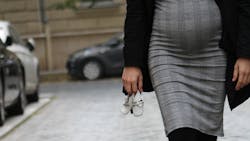NIH begins study of COVID-19 vaccination during pregnancy and postpartum
A new observational study has begun, with a goal of evaluating the immune responses generated by COVID-19 vaccines administered to pregnant or postpartum people. Researchers will measure the development and durability of antibodies against SARS-CoV-2, the virus that causes COVID-19, in people vaccinated during pregnancy or the first two postpartum months.
Researchers also will assess vaccine safety and evaluate the transfer of vaccine-induced antibodies to infants across the placenta and through breast milk.
The study, called MOMI-VAX, is sponsored and funded by the National Institute of Allergy and Infectious Diseases (NIAID), part of the National Institutes of Health (NIH). MOMI-VAX is conducted by the NIAID-funded Infectious Diseases Clinical Research Consortium (IDCRC).
Pregnant people with COVID-19 are more likely to be hospitalized, be admitted to the intensive care unit, require mechanical ventilation, and die from the illness than their non-pregnant peers. Severe COVID-19 during pregnancy also may put the infant at risk for complications such as preterm birth. Individuals who are pregnant or breastfeeding can choose to receive authorized COVID-19 vaccines, and studies to gather safety data in these populations are ongoing. So far, COVID-19 vaccines appear to be safe in these populations. The NIAID study will build on these studies by improving the understanding of antibody responses to COVID-19 vaccines among pregnant and postpartum people and the transfer of antibodies to their infants during pregnancy or through breast milk. Experience with other diseases suggests that the transfer of vaccine-induced antibodies from mother to baby could help protect newborns and infants from COVID-19 during early life.
Investigators will enroll up to 750 pregnant individuals and 250 postpartum individuals within two months of delivery who have received or will receive any COVID-19 vaccine authorized or licensed by the U.S. Food and Drug Administration. Their infants also will be enrolled in the study.
Participants and their infants will be followed through the first year after delivery.
Pregnant participants enrolled in the study prior to receiving a vaccine will have blood drawn at enrollment as well as approximately one month after vaccination.
To assess transfer of antibodies through the placenta and the levels and durability of antibodies in infants, researchers will perform antibody testing on samples from umbilical cord blood collected at delivery and blood samples collected from infants two and six months after delivery.
Investigators also will assess the potential effects on maternal immune responses and transfer of antibodies across the placenta according to the mother’s age, the trimester of pregnancy during which the vaccine was received, the mother’s health, and the mother’s COVID-19 risk status. Additionally, mothers will have the option of providing breast milk samples at approximately two weeks, two months, six months, and 12 months after delivery. The investigators will evaluate breast milk antibodies to assess the potential for protection against COVID-19 in breastfed infants. Study staff also will gather information on COVID-19 illnesses in pregnant and postpartum participants, birth and neonatal outcomes, and COVID-19 illnesses in infant participants.

